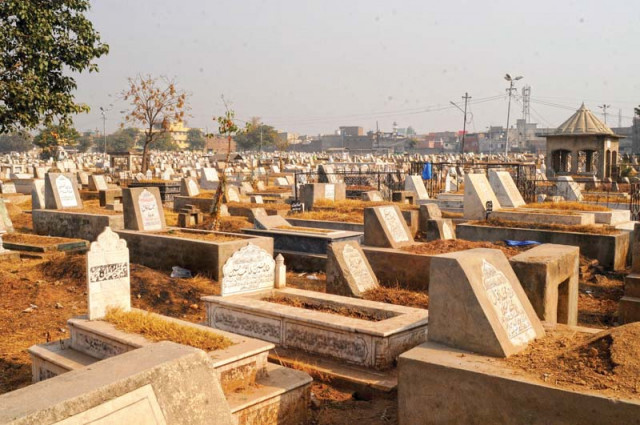Shehar-e-Khamoshan: Pindi fails to complete its new graveyard
Residents have to fork out thousands of rupees to purchase burial space in overflowing graveyards

Graveyard. PHOTOS: EXPRESS
Such is the state of graveyards in the ancient city of Rawalpindi that graveyard authorities have been demolishing and paving over old and unclaimed graves to bury the new bodies they have been getting, charging thousands to provide for a final resting place for the deceased.
To make matters worse, some areas designated for graveyards in the city were encroached on by mushrooming housing societies.
The former Punjab government had first announced to build a set of modern graveyards across the province in a project termed Shehar-e-Khamoshan (silent city). Originally announced in 2015, the project was planned to be built in Lahore, Multan and Sargodha districts. Later, it was decided to expand the project to other cities of Punjab as well including Gujranwala, Sialkot, Gujrat, Mandi Bahauddin, Hafizabad, Narowal and Rawalpindi.
The series of graveyards to be set up under the project were supposed to be operated by Shehar-e-Khamoshan Authority in the respective cities.
In light of this, the provincial government had decided to build a modern graveyard under the Shehar-e-Khamoshan Authority in the city spread over 2,000 kanals of land near Dhamyal Rakh. Land to build a graveyard in the city had been earmarked since 2002, but now the government decided to build it under the Shehar-e-Khamoshan project.
It would feature modern facilities such as a morgue and cold storage to keep bodies. Moreover, it would have buses to ferry the dead.
Walls were erected to demarcate the boundary of the project with a gate, a pathway and prayer area set up. The provincial government then allocated Rs300 million for the project in its annual budget for the fiscal year 2017-18.
The Punjab government was supposed to form a silent authority based on the pattern of the one built in Lahore. The authority would oversee the construction and operation of the modern graveyard in Rawalpindi.
Once built, a ban under Section 144 of the Pakistan Penal Code (PPC) would be imposed on construction of new graves in the 54 old graveyards of the city and the cantonment areas.
Transport was to be provided to the citizens to shift the dead to the new facility.
But with the provincial government failing to set up the authority in Rawalpindi to implement the project, even the funds allocated for it have now lapsed.
Such is the situation in the city that people refrain from announcing the death of a loved one until after they have managed to secure space to bury their dead.
Citizens say they are facing a difficult and painful situation since it has become next to impossible to find burial space for their near and dear ones who have now passed.
With neighbouring Islamabad also imposing a ban on the burial of people not hailing from the capital, residents of Rawalpindi have few places to turn to where they can bury their dead.
Published in The Express Tribune, September 24th, 2018.



















COMMENTS
Comments are moderated and generally will be posted if they are on-topic and not abusive.
For more information, please see our Comments FAQ